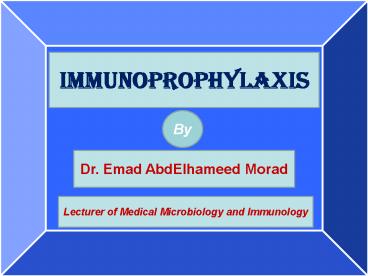IMMUNOPROPHYLAXIS - PowerPoint PPT Presentation
1 / 26
Title:
IMMUNOPROPHYLAXIS
Description:
Title: Beveled Slide Style Author: Nan Shastry Last modified by: emad Created Date: 6/5/2006 7:52:32 PM Document presentation format: On-screen Show (4:3) – PowerPoint PPT presentation
Number of Views:3189
Avg rating:5.0/5.0
Title: IMMUNOPROPHYLAXIS
1
IMMUNOPROPHYLAXIS
By
Dr. Emad AbdElhameed Morad
Lecturer of Medical Microbiology and Immunology
2
- TYPES OF ACQUIRED IMMUNITY
3
- Active acquired immunity.
- Natural active immunity
- Artificial active immunity
- Passive acquired immunity.
- Natural passive immunity
- Artificial passive immunity
- Passive active acquired immunity.
4
- 1. ACTIVE ACQUIRED IMMUNITY
5
- On exposure to foreign antigen, the individual
actively produces his own antibodies or
sensitized lymphocytes. - Immunity develops slowly.
- But lasts for a long time due to development of
immunological memory.
6
- It can be
- Natural active immunity
- It follows infections such as measles.
- Artificial active immunity
- It follows vaccination.
7
- 2. PASSIVE ACQUIRED IMMUNITY
8
- Ready made antibodies are transferred to the
individual. - Immunity develops rapidly.
- But, it lasts only for a short time.
9
- It can be
- Natural passive immunity
- Antibodies transferred from the mother to the
fetus through placenta (IgG) and colostrum (IgA). - Protect the newborn only during first 6 months.
- Artificial passive immunity
- Antitoxic serum in prevention of tetanus and
diphtheria. - Administration of human immunoglobulin and
convalescent sera.
10
- 3. PASSIVE ACTIVE ACQUIRED IMMUNITY
11
- Giving both performed antibodies to give
immediate protection and vaccine for long term
protection. - Examples Post exposure prophylaxis in tetanus,
rabies, hepatitis B.
12
- TYPES OF VACCINES
13
- Killed vaccines.
- TAB vaccine for typhoid and paratyphoid fever.
- Salk vaccine for poliomyelitis.
- Rabies vaccine for rabies.
- Living attenuated vaccines.
- Sabin vaccine for poliomyelitis.
- BCG vaccine for tuberculosis.
- MMR vaccine for measles, mumps, rubella.
- 17D vaccine for yellow fever.
14
- 3. Toxoids.
- Prepared by detoxifying the toxins of some
bacteria. - Such as toxoid vaccine for diphtheria
tetanus. - 4. Vaccines prepared from bacterial or viral
fractions. - Capsular polysaccharide vaccine for pneumococci,
meningococci, Hemophilus influenza type b. - Acellular purified protein vaccine for
Bordetella pertussis. - Surface antigen of hepatitis B virus.
- 5. Recombinant vaccines.
- Prepared by recombinant DNA technology such as
hepatitis B vaccine.
15
- CONCERNS ABOUT VACCINES
16
Killed vaccines Living attenuated vaccines
Stimulate humoral immunity only. They Do not stimulate T cytotoxic cells because it does not replicate inside cells and so viral epitopes are not presented in association with MHC class ? Stimulate both humoral and cell mediated immunity.
They are given by injection, so they stimulate systemic immunity and less effective in stimulating local immunity. Stimulate both local and systemic immunity.
Immunity is short lasing and needs boosting. Immunity is long lasting.
Heat stable. Heat labile and should be properly refrigerated to remain effective.
17
Fewer allergic reactions Vaccines prepared in chick embryo may cause allergic reactions in persons allergic to eggs.
Safe May revert to virulence.
Can be given to immunocompromised hosts and pregnant ladies Not given to immunocompromised hosts and pregnant females.
Given by injection, so there is no herd immunity. Vaccines given orally may be excreted by the immunized person in faeces which will cause spread of the vaccine to the population (Herd immunity) by the feco-oral route. But this could be a problem if the virus reverts to virulence.
Example Salk vaccine for poliomyelitis (IPV) / inactivated polio vaccine Example Sabin vaccine for poliomyelitis (OPV) /oral polio vaccine
18
Capsular polysaccharide vaccine
These vaccines are poor immunogens in young children. However, when conjugated with to carrier protein (diphtheria toxoid), its immunogenicity is enhanced. Examples capsular polysaccharide vaccines for pneumococci, meningococci and Haemophilus influenza type b.
Combined immunization
Examples DPT for immunization against diphtheria, pertussis and tetanus. MMR for immunization against measles, mumps and rubella.
19
- NEW VACCINES
20
- Subunit vaccines
- Microbial polypeptides are isolated from the
infective material. - Example influenza vaccine.
- Synthetic peptide vaccine
- Synthesis of short peptides that correspond to
microbial proteins.
21
- Induction of attenuated non-reverting mutation
- Attenuate the virus irreversibly by removing
genes necessary for virulence. - Recombinant avirulent vector vaccine
- The gene coding for the antigen is inserted into
the genome of avirulent vector such as vaccinia
virus which will then be administered as a
vaccine.
22
- Recombinant antigen vaccines
- Microbial antigens are synthesized by inserting
the coding gene into E. coli or yeast cell. - Example hepatitis B vaccine.
- DNA vaccine
- Gene encoding microbial antigen is carried on a
plasmid vector which is injected in the muscle of
the recipient. - The DNA is taken by the muscle cells and the
microbial antigen is synthesized leading to
stimulation of both humoral and cell mediated
immunity.
23
- Anti idiotypic antibodies
- If Fab fragment of antibody specific for an
antigen is injected in a mouse, the antibody
produced in the mouse is called anti idiotypic
antibody and its structure mimics the original
antigen. - Locally administered vaccines
- Intranasally administered vaccines are used for
viral respiratory diseases to stimulate local
immunity (IgA) at the portal of entry.
24
- SCHEDULE OF VACCINATION
25
Age Vaccine
Birth 1 month BCG
2 months DPT (diphtheria, pertussis, tetanus) OPV (Oral polio vaccine) HBV (Hepatitis B vaccine
4 months DPT, OPV, HBV
6 months DPT, OPV, HBV
9 months Measles vaccine
15 months MMR (measles, mumps, rubella)
18 months DPT, OPV
4 6 years DPT, OPV
26
- Thank You

